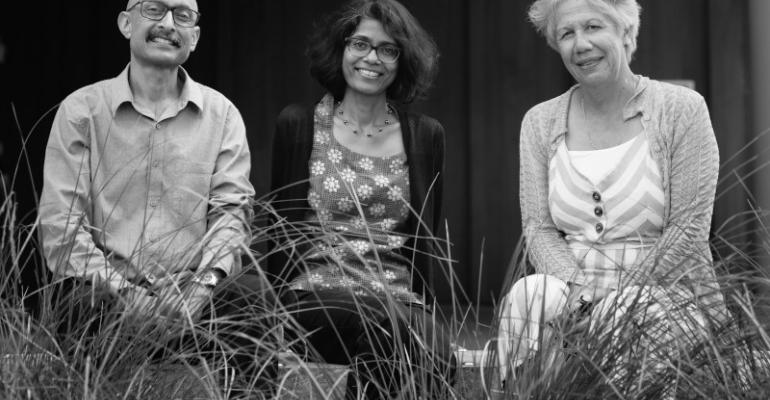- AUTHOR“Tourism is built on the cultural narratives of a place...": Q&A with Priya Kurian, Debashish Munshi and Sandy Morrison
- January 27 2020
“Tourism is built on the cultural narratives of a place…”: Q&A with Priya Kurian, Debashish Munshi and Sandy Morrison

Unique among the NSCs, the Deep South Challenge has a research programme dedicated to understanding the nature of engagement, as well its practice and evaluation. Its major research project looks at the way culture influences people’s decisions about adapting to climate change. This May 2019 Q&A with researchers leading the Culture & Climate Change project foreshadows the team’s research results, due out next month.
The energy bubbling through this research trio from the University of Waikato is infectious, and speaks volumes about the work culture they themselves foster. “Yes!” they respond, collectively. “We have a collaborative research culture with no hierarchies or centres of authority. We draw our inspiration from our research participants, students and interdisciplinary collaborators. We don’t have a designated leader – we follow each other’s lead.”
It must be somewhat difficult to frame a project around culture, when people interpret the idea of culture so differently. “‘Culture’ means many things to many people,” they agree, “and we don’t think there is a common understanding of the word in New Zealand. To some, it’s synonymous with ethnicity; to others, it stands for certain customs, traditions or behavioural characteristics that bind particular groups of people together… We tend to align with the late cultural studies theorist Raymond Williams’ reading of culture as ‘lived experience’. In other words, we see culture as the way people make sense of their everyday lives.”
Their research focusses on the tourism industry, which is particularly vulnerable to our changing climate. Tourism is an excellent prism through which we can understand how culture influences the choices we might make about adapting to climate change.
“Tourism is built on the cultural narratives of a place. What draws tourists to a land and what tourism providers offer to attract tourists tell us a lot about the importance of values, place and practices that underpin culture. The tourism industry demonstrates the critical need to start changing these narratives – by adopting key Māori values, for example – in adapting to climate change.”
And yet the media, the “general public” and researchers themselves sometimes assume there are values and even emotions that all Kiwis share. How much does the team think this is true or not true? “We hear a lot about ‘Kiwi values,’” they say, “as if there’s one definitive set of values that’s common to every New Zealander. We don’t believe that’s true. This is a diverse country, not just ethnically diverse but also in terms of socio-economic status, access to resources, geographical location, political, cultural and ideological leanings, and circumstances of life… People have different approaches to what is ‘valuable’ in their lives.
“At the same time,” they continue, “values such as manaakitanga and kaitiakitanga and many other values from te ao Māori are woven into our cultural and social landscapes here, and shape our diverse ways of being New Zealanders.” One key manifestation of culture is story-telling, whether through movies, novels, press releases or even in tweets.
“Over the summer,” the team tells us, “we read a huge amount of climate fiction. Reading dozens of novels and short stories, we realised the power of stories to get the message of climate change across to communities. We see this also with many Māori narratives that offer insights into natural phenomena and spark so many enlightening ‘aha’ moments. They show us the possibilities for public engagement on climate change adaptation.”
Some Challenge researchers have talked about supporting their children to attend the recent high school students’ climate strike. The research trio takes this support one step further. “The recent School Strike 4 Climate showed us that our young people ‘get it’. It’s time the adults came through too… Wouldn’t it be great to work with those who currently have no say in the electoral process to develop plans, policies and recommendations for action on climate change and climate adaptation?”
This interview first appeared in Kia Urutau: The magazine of the Deep South Challenge, May 2019.